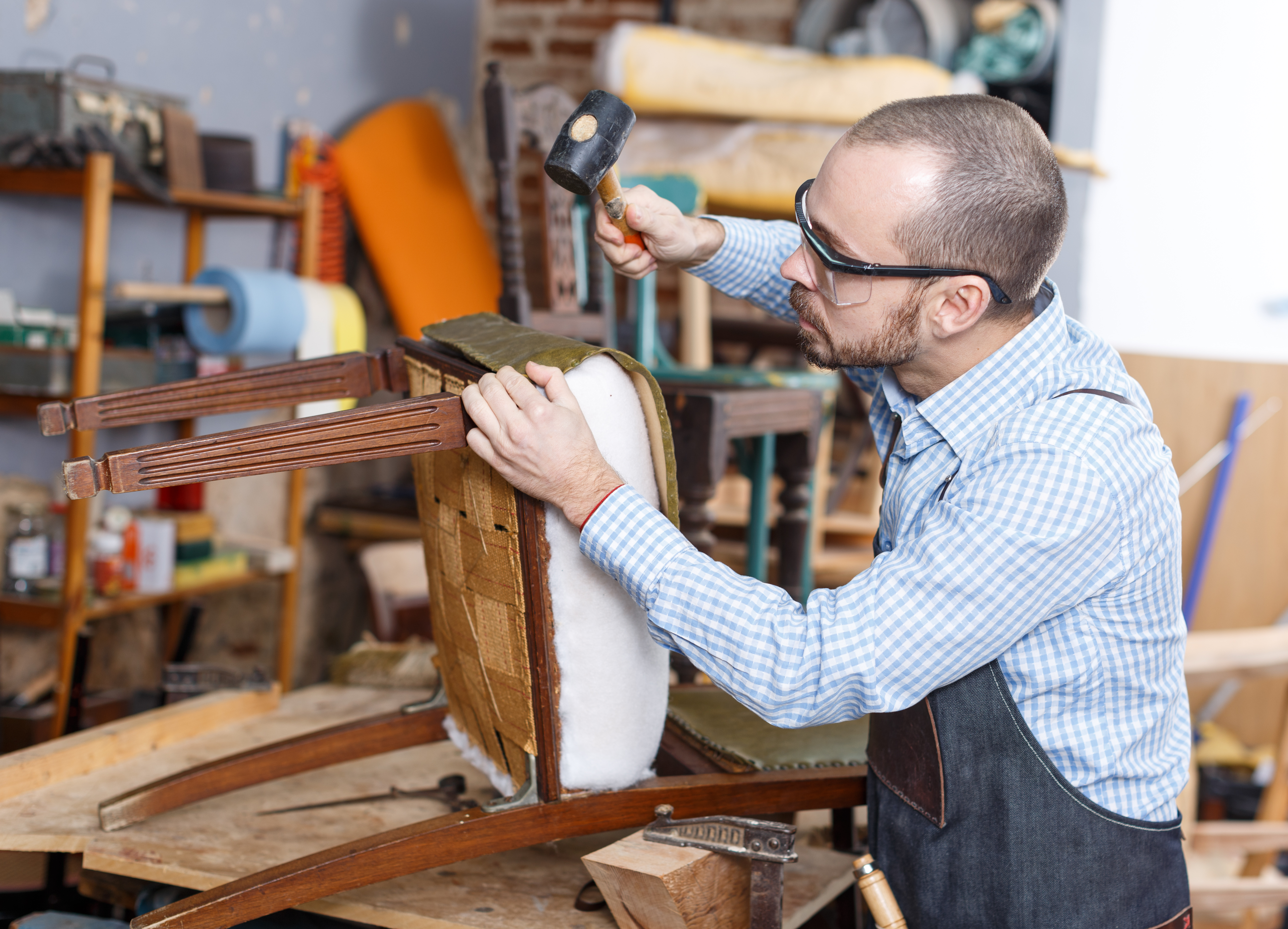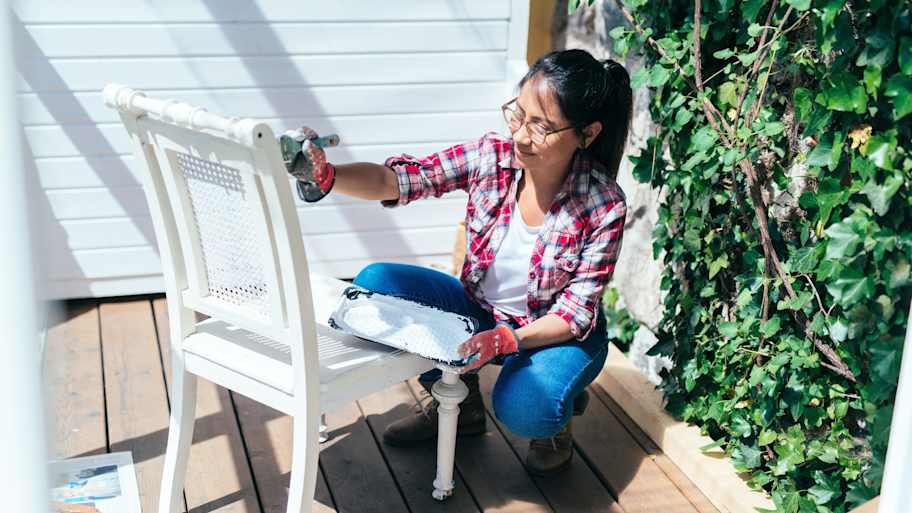
Discover the average furniture reupholstery cost, what impacts pricing, and how to save money on your next project. Get expert tips and cost breakdowns.
The average cost to reupholster a chair runs between $300 and $1,100, with most homeowners spending an average of $750. Key factors include chair type, size, fabric, and labor.


The cost to reupholster a chair depends on chair type, fabric, and labor rates.
Dining chairs are the most affordable to reupholster, starting at $100, while armchairs cost upwards of $640.
Synthetic blend fabrics cost as little as $15 per yard, while leather and designer fabrics cost $100 per yard or more.
Professional reupholstery ensures quality and durability, with labor rates ranging from $40 to $100 per hour.
This article was created using automation technology and thoroughly fact-checked and edited by an Angi Editor in accordance with our AI policy.
The average cost to reupholster a chair ranges from $300 to $1,100, with most projects averaging $750. A simple project can cost as little as $60, while larger pieces or antiques can reach up to $2,000 or more. Prices vary based on chair type, fabric selection, and labor. Simple dining chairs may cost less, while large or antique chairs can be more expensive.
Homeowners often choose reupholstery to preserve beloved pieces or update décor. Labor costs range from $40 to $100 per hour, and fabric costs $15 to $100+ per yard. This guide will walk you through all the details you need to make an informed decision on your chair reupholstery project.
The cost to reupholster a chair depends on several key factors. Understanding these will help you anticipate your project’s price and choose options that fit your goals and budget.
The type of chair you want to reupholster has a major impact on the final cost. Simple dining chairs are less expensive due to minimal fabric and straightforward construction. Armchairs, recliners, wingbacks, and antique chairs often require more skill, time, and materials. Complex shapes, decorative features, and built-in cushions add to labor and material needs.
| Chair Type | Average Cost Range |
|---|---|
| Dining | $100–$550 |
| Accent | $210–$620 |
| Armchair | $640–$1,550 |
| Wingback | $500–$1,750 |
| Recliner | $520–$1,720 |
| Antique | $800–$1,500 |
Chairs with tufting, piping, or unique shapes require more time and attention. Antique chairs may need structural repairs or specialty materials, increasing costs.
Chair size directly influences both material and labor costs. Larger chairs require more fabric and often take longer to reupholster. For example, a small desk chair with no arms uses less fabric and labor than an oversized armchair with deep cushions and extended armrests.
| Chair Size | Average Cost Range |
|---|---|
| Small | $100–$500 |
| Medium | $500–$900 |
| Large | $900–$1,500 |
The choice of fabric and other upholstery materials is a significant cost driver. Fabric prices vary widely based on type, durability, and pattern. Standard cotton or polyester blends are affordable, while leather, velvet, and designer fabrics cost more per yard. Most chairs require three to seven yards of fabric, depending on size and design.
| Material Type | Cost per Yard | Total Material Cost Range |
|---|---|---|
| Cotton blend | $20–$50 | $60–$350 |
| Linen | $25–$45 | $75–$315 |
| Synthetic blend | $15–$35 | $45–$245 |
| Velvet | $40–$70 | $120–$490 |
| Leather | $50–$100 | $150–$700 |
| Designer fabric | $70–$270 | $210–$1,890 |
Other materials, such as foam, batting, webbing, springs, or decorative trims, can add $25 to $200 or more, depending on the extent of replacement and upgrades.
Durable, stain-resistant fabrics may cost more upfront, but often last longer. Patterned fabrics may require extra yardage for proper alignment, increasing material costs.
Professional upholsterers or specialty shops handle chair reupholstery. Labor rates range from $40 to $100 per hour, or a flat fee based on the chair’s complexity. More experienced upholsterers and those in higher-cost regions may charge more.
Labor costs rise with custom features like tufting, piping, or nailhead trim. Repairs, such as tightening joints or replacing springs, also add time and expense. Most simple chairs take four to eight hours to reupholster, while complex or antique chairs may require 10 to 20 hours. The entire process, including fabric selection and scheduling, takes an average of one to two weeks.
Preparation costs include removing old fabric, padding, and staples. Some upholsterers charge $20 to $100 for this service, especially if the original material is difficult to remove or in poor condition. The frame is inspected for damage, and minor furniture repairs or cleaning may be necessary. If the frame requires deep cleaning or treatment for pests or odors, additional fees may apply. There may also be small disposal fees for old materials.
Tipping is not required for upholsterers, but it is appreciated for exceptional work. If you choose to tip, $20 to $50 per chair is a common range. Alternatively, a thoughtful thank-you note or a positive online review can show appreciation for quality craftsmanship.
Several extras can affect the final price:
Frame repairs, such as fixing loose joints or reinforcing the structure
Spring replacement or repair
Customizations like tufting, piping, nailhead trim, or embroidery
Pickup and delivery fees starting at $100, depending on distance
Rush service fees for expedited turnaround
Environmental or disposal fees for hazardous materials, if applicable
These add-ons can range from a modest increase to several hundred dollars, depending on the scope and detail of the work.
While reupholstering a chair is mostly a one-time expense, a few ongoing costs are worth considering to protect your investment.
Routine care helps keep your reupholstered chair looking fresh. Regular vacuuming and prompt spot cleaning prevent dirt and stains. Professional upholstery cleaning costs $90 to $190 per chair, depending on fabric and location. Fabric protection treatments, such as stain guards, add $30 to $100. Simple habits, like rotating cushions and keeping the chair out of direct sunlight, can extend its lifespan.
There are no significant ongoing operating costs for a reupholstered chair. Optional purchases, such as slipcovers or furniture protectors, cost $20 to $100 and help shield your new upholstery from spills and wear.
Even with quality work, minor repairs may become necessary over time. Common issues include loose seams, fabric wear, or cushion flattening. Minor upholstery repairs cost $25 to $200 per chair. Consider a warranty or service plan if your chair is valuable or sees heavy use.
Standard homeowners insurance covers furniture damage from fire, theft, or some natural disasters. High-value or antique chairs may need additional coverage, which costs extra depending on the item’s appraised value. If your chair is especially valuable or a family heirloom, discuss coverage options with your insurance provider.
Choosing between DIY and professional reupholstery comes down to budget, skill level, and the chair’s complexity. Let’s look at the differences.
DIY reupholstery requires basic tools like a staple gun, pliers, upholstery needles, and scissors. Material costs remain, but you save on labor. Expect to spend $100 to $400 on fabric and supplies for a simple chair. More complex projects need advanced skills, time, and patience.
Professionals charge more, but the results are often longer-lasting and more polished. DIY is best for simple dining or accent chairs, while valuable, antique, or complex chairs should be left to experts.
| Approach | Average Cost | Pros | Cons |
|---|---|---|---|
| DIY | $100–$400 | Saves on labor; flexible timeline; hands-on customization | Time-consuming; requires skill; risk of mistakes; may lack professional finish |
| Pro | $300–$1,100 | Professional quality; warranty; complex repairs handled | Higher cost; less control over process; schedule dependent |
Popular add-ons enhance comfort, appearance, or function. Each comes with its own price tag:
Adding or replacing cushions or foam inserts: $50 to $200 per chair
Decorative trim (piping, nailhead, fringe): $30 to $150 per chair
Custom embroidery or monogramming: $50 to $200
Matching ottoman or pillow reupholstery: $100 to $400
Frame refinishing or painting: $50 to $300
Pickup and delivery services: $100 to $300
Fabric protection or stain guard application: $30 to $100
These extras personalize your project and can help your chair blend seamlessly with your décor.
You can save money on your chair reupholstery project with a few strategic choices:
Get multiple quotes from local furniture upholsterers to compare prices and services.
Choose budget-friendly, durable fabrics that offer good value.
Reuse existing padding or foam if it’s still in good condition.
Handle prep work yourself, such as removing old fabric and staples.
Opt for simple designs and avoid customizations like tufting or nailhead trim.
Bundle multiple chairs for volume pricing with your upholsterer.
Consider partial reupholstery, such as seat-only, for additional savings.
Small steps like these can add up to significant savings without sacrificing quality.
Home is the most important place on earth, which is why Angi has helped more than 150 million homeowners transform their houses into homes they adore. To help homeowners with their next project, Angi provides readers with the most accurate cost data and upholds strict editorial standards. We extensively research project costs to develop the pricing data you see, so you can make the best decisions for you and your home. We rely on reputable sources, including the U.S. Bureau of Labor Statistics, academic journals, market studies, and interviews with industry experts—all to ensure our prices reflect real-world projects.
Want to help us improve our cost data? Send us a recent project quote to [email protected]. Quotes and personal information will not be shared publicly.
From average costs to expert advice, get all the answers you need to get your job done.

Discover the average furniture reupholstery cost, what impacts pricing, and how to save money on your next project. Get expert tips and cost breakdowns.

Wondering how much it costs to refinish a table? Get average prices, cost factors, and tips to help you budget and choose between DIY or hiring a pro.

Get transparent furniture refinishing cost information and learn average prices, cost factors, and ways to save before hiring a pro and starting your project.

Have a piece of furniture that doesn’t work in your space or needs a refresh? Learn how to paint furniture at home with these simple steps.

Discover average furniture repair cost, key price factors, and ways to save. Get expert tips to budget for your next furniture repair project.

Give your old furniture a fresh look with these tips for refinishing furniture, perfect for DIYers ready to restore and refresh.